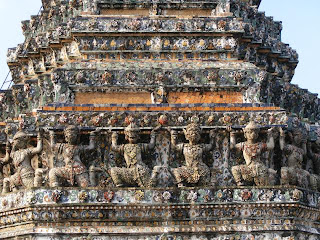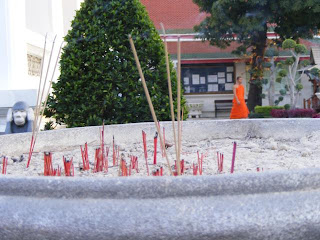We went to visit Wat Arun or The Temple of the Dawn taking the boat – to traverse Chao Praya – form the Tha Tien station. The temple may be visited between 8.30-17.30 and the entrance ticket costs 50 bht.
In fact, the complete name of the temple is Wat Arunratchawararam Ratchaworamahawihan.and it was changed during his history from Wat Makok during Ayutthaya period, to Wat Khaeng during the reign of the King Taksin, when Thonburi was made capital of Siam. The greatest developments of the temple took place during the reign of the Rama kings.
The central prang (tower) of the temple, in Khmer style, is 86 m heigh and it is surrounded by 4 smaller prangs. The richness of decorations, made of porcelain, is astonishing! The little pieces of porcelain came from the Chinese vessels, which used them as balast.
The temple is a mixture of beliefs in Buddhist and Hindu gods (e.g. Indra, a Hindu deity,on the “erawan” a three headed elephant).
For a photographer, even if a non-professional one, this temple is Heaven on Earth with the many details which make you push the button continuously…But not only in the zone of the prangs. The courtyard with amny other buildings is also rewarding. We waitied till the sunset and then the view became breathtaking…
La Wat Arun sau Templul Zorilor ajungi trecand cu barca din statia Tha Tien, langa Marele Palat, pe malul celalalt al Chao Praya. Te costa doat 3 baht si traversarea dureaza cateva minute. La Wat Arun sunt mereu vizitatori, mai putini - e drept - la ora tarzie cand am ajuns noi. Templul se poate vizita intre 8.30 - 17.30 si intrarea costa 50 bht. De fapt, numele complet al templului este Wat Arunratchawararam Ratchaworamahawihan. Dragut, nu? Denumirea a fost schimbata de cateva ori
(Wat Makok in timpul Regatului Ayutthaya, cand a fost construit, Wat Khaeng in timpul Regelui Taksin, cand Thonburi a devenit capitala), cea de Wat Arun datorandu-se regelui Rama al IV-lea care dorea ca astfel sa conserve numele zeului zorilor, Aruna.
Cu turnul (prang) sau inalt de 86 de m, construit in stilul Khmer, templul a devenit o emblema a Bangkokului, fiind admirat de catre turisti mai ales la apusul soarelui. Constructia s-a desavarsit in timpul lui Rama I. Turnul simbolizeaza miticul Munte Meru, lacasul zeilor hindusi.
Acesta este, de fapt, locul in care se zaboveste cel mai mult. Turnul principal este inconjurat de alte patru turnuri, mai mici (dedicate zeului budhist Phra Pai) si toate sunt impodobite cu bucatele de portelan de diferite culori si cu diverse modele, aranjate in mod mestesugit. Am intalnit deja acest procedeu la chedi-urile din Wat Pho dar aici ornamentele sunt si mai bogate, obligandu-te sa-l privesti in detaliu pe fiecare. De unde provin aceste bucati de portelan? De la vasele care veneau din China (vestita pentru portelanul sau) si care le foloseau ca balast.
Constructia reprezinta un amestec de credinte budhiste si hinduse, dupa cum dovedeste prezenta zeitatii hinduse Indra, calarind pe "erawan", elefantul cu trei capete.
Evident ca Wat Arun nu inseamna doar prang-ul central si cele patru inconjuratoare. In curte sunt mai multe cladiri, fiecare cu caracteristici proprii si nu mai putin frumoase decat ce am vazut pana acum.
Nu mai era mult pana la ora inchiderii, iar soarele incepea sa apuna. Era chiar ceea ce venisem sa vedem aici si spectacolul nu ne-a dezamagit.
In fact, the complete name of the temple is Wat Arunratchawararam Ratchaworamahawihan.and it was changed during his history from Wat Makok during Ayutthaya period, to Wat Khaeng during the reign of the King Taksin, when Thonburi was made capital of Siam. The greatest developments of the temple took place during the reign of the Rama kings.
The central prang (tower) of the temple, in Khmer style, is 86 m heigh and it is surrounded by 4 smaller prangs. The richness of decorations, made of porcelain, is astonishing! The little pieces of porcelain came from the Chinese vessels, which used them as balast.
The temple is a mixture of beliefs in Buddhist and Hindu gods (e.g. Indra, a Hindu deity,on the “erawan” a three headed elephant).
For a photographer, even if a non-professional one, this temple is Heaven on Earth with the many details which make you push the button continuously…But not only in the zone of the prangs. The courtyard with amny other buildings is also rewarding. We waitied till the sunset and then the view became breathtaking…
La Wat Arun sau Templul Zorilor ajungi trecand cu barca din statia Tha Tien, langa Marele Palat, pe malul celalalt al Chao Praya. Te costa doat 3 baht si traversarea dureaza cateva minute. La Wat Arun sunt mereu vizitatori, mai putini - e drept - la ora tarzie cand am ajuns noi. Templul se poate vizita intre 8.30 - 17.30 si intrarea costa 50 bht. De fapt, numele complet al templului este Wat Arunratchawararam Ratchaworamahawihan. Dragut, nu? Denumirea a fost schimbata de cateva ori
(Wat Makok in timpul Regatului Ayutthaya, cand a fost construit, Wat Khaeng in timpul Regelui Taksin, cand Thonburi a devenit capitala), cea de Wat Arun datorandu-se regelui Rama al IV-lea care dorea ca astfel sa conserve numele zeului zorilor, Aruna.
Cu turnul (prang) sau inalt de 86 de m, construit in stilul Khmer, templul a devenit o emblema a Bangkokului, fiind admirat de catre turisti mai ales la apusul soarelui. Constructia s-a desavarsit in timpul lui Rama I. Turnul simbolizeaza miticul Munte Meru, lacasul zeilor hindusi.
Acesta este, de fapt, locul in care se zaboveste cel mai mult. Turnul principal este inconjurat de alte patru turnuri, mai mici (dedicate zeului budhist Phra Pai) si toate sunt impodobite cu bucatele de portelan de diferite culori si cu diverse modele, aranjate in mod mestesugit. Am intalnit deja acest procedeu la chedi-urile din Wat Pho dar aici ornamentele sunt si mai bogate, obligandu-te sa-l privesti in detaliu pe fiecare. De unde provin aceste bucati de portelan? De la vasele care veneau din China (vestita pentru portelanul sau) si care le foloseau ca balast.
Constructia reprezinta un amestec de credinte budhiste si hinduse, dupa cum dovedeste prezenta zeitatii hinduse Indra, calarind pe "erawan", elefantul cu trei capete.
Indra, calare pe "erawan"
Pentru amatorul de fotografii acesta este, intr-adevar un loc unde se poate pierde in detalii. Timpul e mult prea scurt ca sa le observe pe toate.Evident ca Wat Arun nu inseamna doar prang-ul central si cele patru inconjuratoare. In curte sunt mai multe cladiri, fiecare cu caracteristici proprii si nu mai putin frumoase decat ce am vazut pana acum.
Nu mai era mult pana la ora inchiderii, iar soarele incepea sa apuna. Era chiar ceea ce venisem sa vedem aici si spectacolul nu ne-a dezamagit.

































16 comments:
lovely photos...and there's so much detail in the decoration of...well everything! So much to look at, take in and appreciate! Love the peaceful calm of your last photo!
Thank you, Theanne, for your comment!
Great parade of decorations... and I saw another nice couple of benches!
Ok, VP, you may have them!
The details on the first shots is just amazing.
the architecture of these temples is amazing! great pics!
It was captivating to photograph them, Randy. Thanks for the comment!
All of them were beautiful, Duncan. Thanks!
Chiar ca m-as pierde in amanunte. Doamne, ce-i acolo !!! Mi-au placut si esarfele colorate legate pe tulpinile copacilor. Ofrande ?
Da, ofrande, Dani! Cred ca voi face la sfarsit o postare colorata cu toate, fiindca am fotografiat multe. Imi plac si mie, atat de colorate...
What a difficult name for the temple Traveling Hawk, but a schhitterende temple. I believe that this greaag templ for photographers heaven on earth.
Truly beautiful colorful blog with beautiful photos. Also you fot of the beautiful skies I've seen emt admiration. Absolutely beautiful! I loved.
Greetings, Helma
Thank you very much, Helma dear, for your visit!
Si acest templu m-a ramas la suflet, e incredibil cata munca au depus pentru realizarea acelor detalii....Foarte frumos!
Asa e, Claudia. Am citit si la tine pe blog despre el, inainte de a pleca:)
Awesome details porcelain!
The pictures you are impressive!
many greetings
Thanks you for coming along, Magda!
Post a Comment